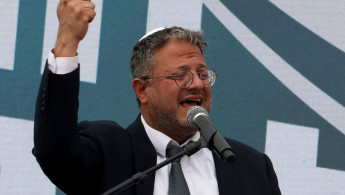Israel: Extremist minister Ben-Gvir meets army commander to discuss 'National Guard', despite no-contact policy
Israel's extremist National Security Minister Itamar Ben-Gvir broke a strict no-contact policy between army commanders and senior politicians by meeting with his pick for the head of a new paramilitary unit, local media reported Thursday.
Haaretz reported that Avinoam Emunah, a colonel in Israel’s tactical command college, was condemned by fellow army officers for meeting with the far-right politician to discuss his possible appointment for the recently approved "National Guard", a unit that critics say will act as a private militia with police powers working at the behest of extremist politicians.
"[The meeting] violated the prohibition on direct contact between [Israeli military] servants and the senior political officials," said Chief of Staff Herzl Halevi on Israel’s Army Radio.
Emunah - set to retire in six months - has publicly acknowledged that he meet with Ben-Gvir, but has said that they only met once, according to The Times of Israel.
He was censured by the Israeli military for the meeting.
The Israeli commander has previously sparked widespread controversy for encouraging his soldiers to enjoy killing Palestinians, refusing to work with a woman, and for his strict religious views.
He has been involved in several brutal repression campaigns against Palestinians, including the Second Intifada, the invasion of Lebanon, and the war on the besieged Gaza Strip in 2014.
The Israeli cabinet approved the establishment of a new law enforcement body, the "National Guard", earlier this month.
Ben-Gvir - known for his inflammatory anti-Palestinian rhetoric, storming the Al-Aqsa Mosque, and marching in favour of illegal settlements in the occupied West Bank - is expected to establish a committee that outlines how the unit will operate within the next 90 days.
Once submitted, the outline will need to be approved by Israel’s far-right government, which has already caused widespread protests over their plans for judicial reform.
Palestinians have expressed deep concern that the unit will act as another tool for Israel to persecute them further.
Civil rights groups have also voiced fears that bringing such force under the control of a minister could politicise policing and undermine law enforcement principles.





 Follow the Middle East's top stories in English at The New Arab on Google News
Follow the Middle East's top stories in English at The New Arab on Google News


